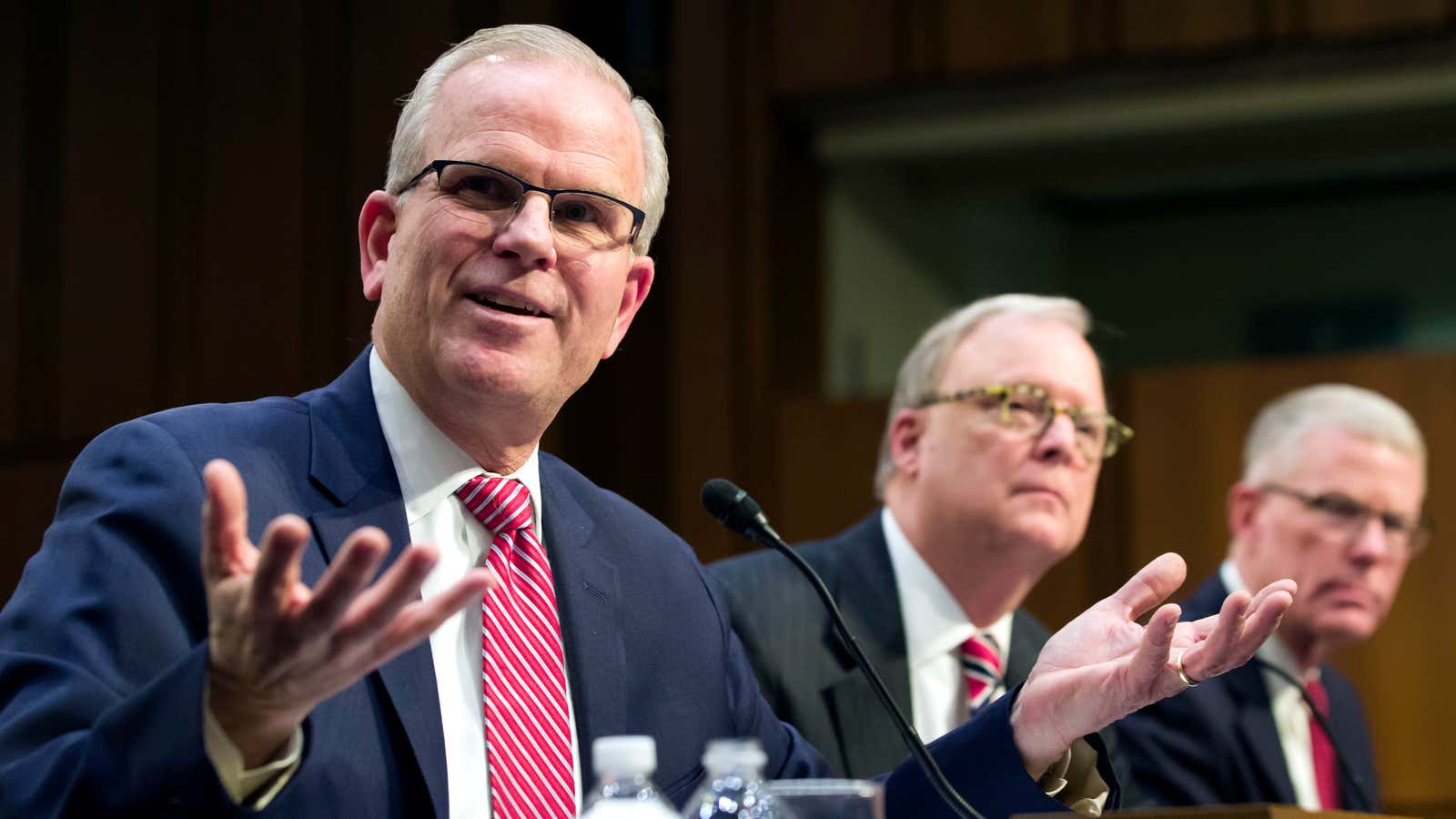In his first public questioning since deciding to ground the Boeing 737 Max, the acting head of the US Federal Aviation Administration defended his agency’s delegation of key safety inspections and tests to the plane’s manufacturer.
Daniel Elwell, a former pilot and airline lobbyist who joined the Trump administration as part of a deregulatory task force, insisted the FAA followed normal procedures in approving the aircraft for passenger service, and dismissed concerns expressed by pilots and engineers about the design of the new aircraft and its training procedures.
“The certification process was detailed and thorough, but, as is the case with newly certified products, time yields more data…that is what has happened in the case of the 737 MAX,” he said in prepared testimony before a Senate aviation subcommittee.
Others were not as convinced. “Clearly, confidence in the FAA as the gold standard of aviation safety has been shaken,” Colin Scovel, the Department of Transportation inspector general leading a wide-ranging investigation into how the FAA approved the plane, testified.
The discussion was hampered by the still unfinished investigations into the crashes of 737 Max planes in Ethiopia and Indonesia that killed 346 people. The limited information released or leaked by investigators, alongside independent analysis from aerospace engineers and pilots, suggests that flight control software adopted to reduce the need for pilot training played a key role in the accidents.
The software, called the Maneuvering Characteristics Augmentation System (MCAS), was introduced because design changes on the 737 Max gave it a different aerodynamic profile than its predecessors. In some situations, the plane had a tendency to stall, and MCAS automatically adjusted the plane’s tail to push the nose down. Crash investigators suspect that this software forced the crashed planes into dives, and their pilots lacked the awareness or know-how to shut off the software and recover in time.
The MCAS software was approved in a process in which the FAA certified a team of Boeing engineers, ostensibly separate from those building the plane, “to conduct inspections and tests and issue certificates on behalf of the FAA.” That team approved the MCAS software and training, and the FAA approved Boeing’s decisions. Scovel’s investigation will examine the circumstances of those approvals.
Elwell said he was confident in MCAS, but lawmakers pressed him on how the software was presented in pilot manuals. “There was not specific instruction on the MCAS, to my knowledge,” Elwell said in one response to one question, “because it was not a system that went directly to what the pilots flew.”
The top flight safety official seemed at times to play semantic games with the lawmakers.
Pilots voluntarily report concerns about aircraft to a NASA safety database, and reports about the 737 Max increased since the October 2018 Lion Air crash. Elwell said that “none of the 24 reports associated with the Max related to the MCAS,” which was in a strict sense true—MCAS has not been associated with an aviation accident in the US. Senators pointed out that Elwell ignored pilots specifically voicing concerns about MCAS, with one calling the training manual for the software “inadequate and almost criminally insufficient.“
At another point, Elwell denied reports that previous versions of the 737 Max would disengage flight software if pilots jerked their control yokes backward. Minutes later, asked if pilots knew what to do in the event of an MCAS malfunction, National Transportation Safety Board chair Robert Sumwalt, a former 737 pilot, said “I do believe that the first thing you would do is oppose that motion by pulling the yoke back…now apparently that feature is not on the [737 Max].”
When senators asked about reports that Boeing made displays of the sensors used by MCAS and a warning light to show if they disagreed optional extras and not mandatory safety features, Elwell insisted that since the FAA did not consider them “safety critical,” they were not.
Elwell also repeatedly refused to answer questions about what president Donald Trump told him about his decision to ground the 737 Max. Boeing CEO Dennis Muilenberg personally lobbied Trump to keep the 737 Max flying after regulators around the world grounded the plane.
Elwell argued that his agency was the only one to make their decision to ground the 737 Max based on actual flight data, obtained from the satellite surveillance company Aireon. He also noted that pilot unions backed his decision to keep the planes in the air, reporting that “they said to a group, we are absolutely confident in the safety of the aircraft and our pilots level of training in flying it.”
For more detail, we await the investigations into how the 737 Max was approved, and what delayed the FAA decision to ground the plane.
“American safety officials lagged instead of led the world…and that put American passengers in peril,” senator Richard Blumenthal, a Connecticut Democrat, said.
